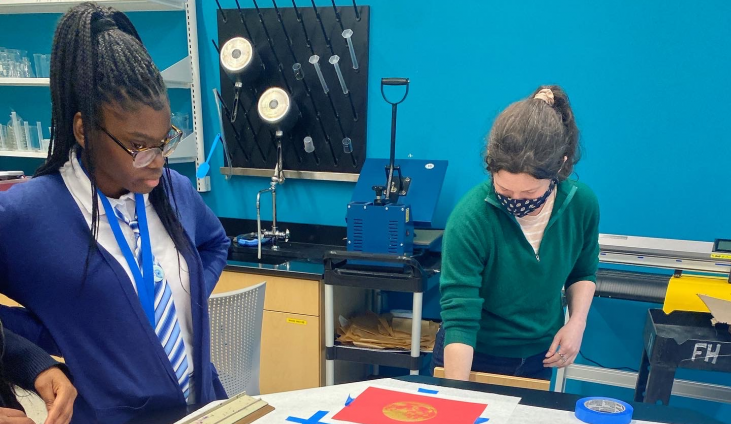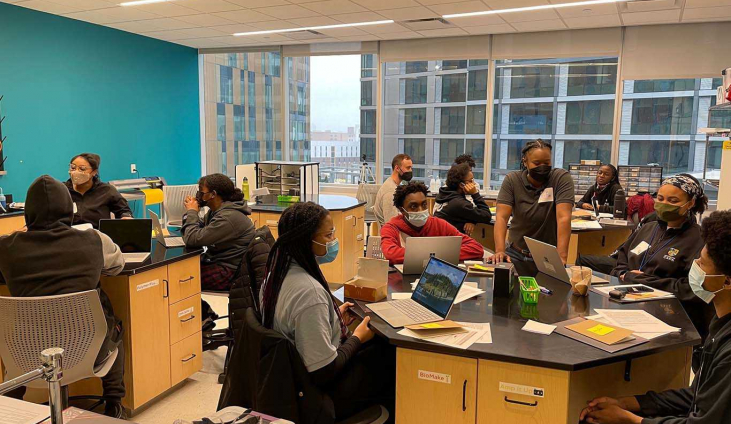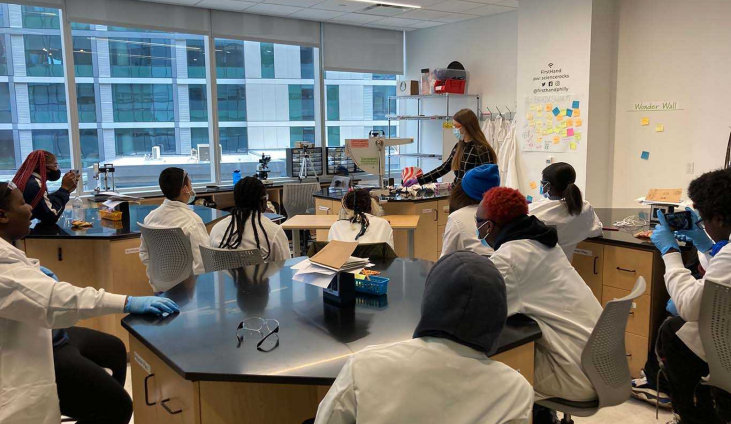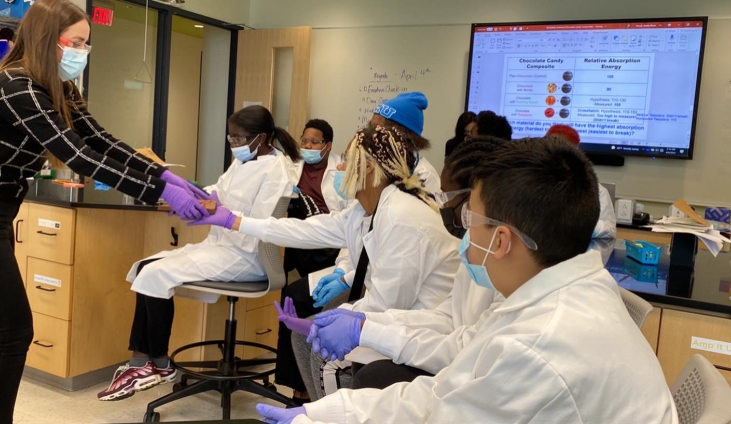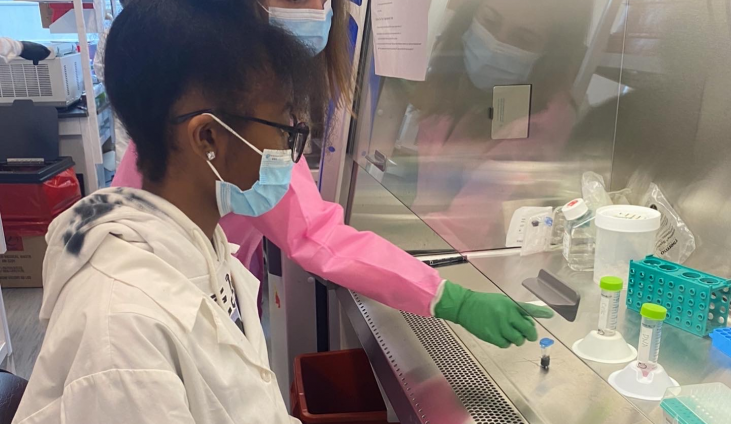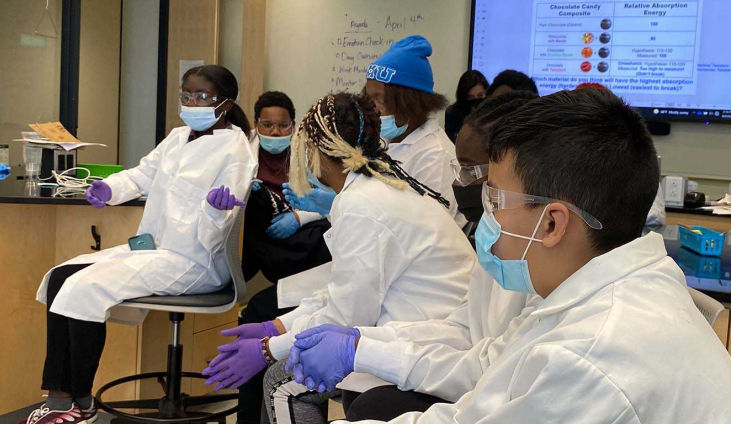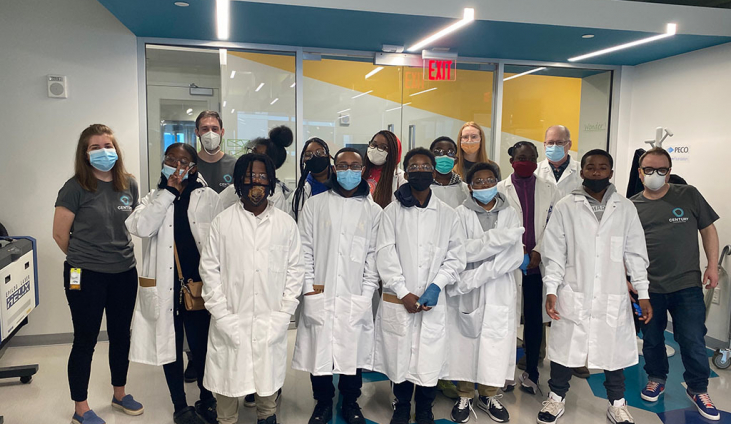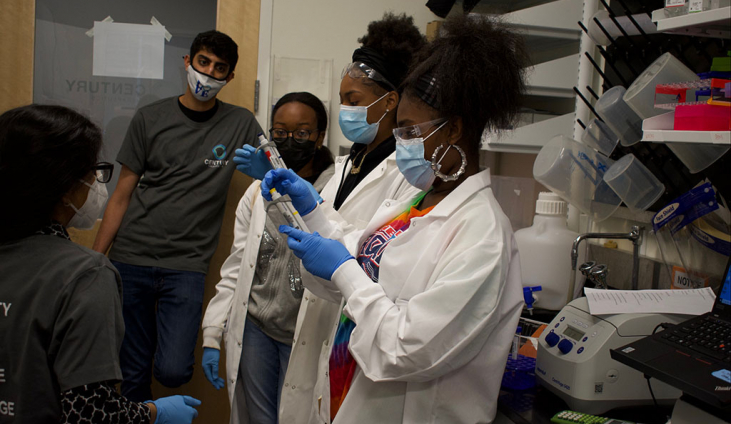While many students are participating in FirstHand curriculum because of our partnerships with local schools, there are also students from all over the city who applied to participate in the UX Design Sprint, also currently underway in the lab.
The open recruitment for the UX Design Sprint will continue in the future, with applications open to all Philadelphia high school students. It also marks the beginning of FirstHand’s shift to a new model for High School programming. “Sprints” are 8-week, focused trainings that are co-developed and co-facilitated by professionals working in the field, to ensure students gain real-world, sector-specific skills.
Although being back in the lab has been overwhelmingly positive, our FirstHand team has been hard at work making sure supplies are set up each day, which initially was challenging coming off a period of two years without fully operational in-person classes.
Despite the need for precautions like masking, spacing, and air flow, educators, mentors and students alike recognize there are inherent benefits to being in person in the lab.
One major proponent is Mr. McDermott, a science teacher at John F. McCloskey School who has been accompanying his students participating in Polymer Play to the FirstHand lab at 3675 Market Street.
“Being in a lab is much more beneficial because of the communal experience; kids can play off each other which they didn’t get in a virtual setting. They can see and experience what an actual lab looks like, and what an actual STEM business looks like. When they get to high school, they are going to have a knowledge base to start with, and that’s fantastic,” he explains. “Now I have a lot of kids tell me once they go on to high school that they are learning now what they already learned with FirstHand [in middle school] -- so they have a leg up on everyone else.”
FirstHand volunteer, David Royer, Head of Product and Design for Wodify agrees. When it comes to the UX Design Sprint he is opening FirstHand high schoolers’ eyes to career possibilities. “UX is such a great career path. It’s creative, it’s enjoyable, you’re making things easier for people to use so you feel like it’s a positive contribution to the world -- and you get paid well. A lot of people don’t even know about it as a career path so this an opportunity to introduce a bunch of smart high school students to it.”
As part of this user experience-focused curriculum, students will work on learning key principles of design, utilizing different software and platforms like Figma, storyboarding and usability testing in developing their projects, solving common problems in app design, building a prototype and creating the first addition to their design portfolios.
“The community is so positive. We come in, we do our stuff, and it’s fun too. We get to say what we want, everyone listens and gets along, and then we come up with our own ideas.”
In the final showcase for the UX Design Sprint, the students will present their app prototypes which will seek to solve one of three problems: social media addiction, education during the COVID pandemic, and physical impairments or disabilities.
How does the in-person setting help with UX design? “In particular for design there’s a lot of collaboration and feedback that goes on that needs to happen face-to-face and the ability to quickly sketch something out in ‘early concept’ and show it to someone on your team and getting their feedback immediately is nice. Also giving and receiving feedback, being able to read someone’s body language and face and gaging if you’re being too hard is pretty useful, it often results in better teams and teamwork,” Royer adds.
For all of these reasons and more, the students agree.
Aaron Polk, a 16-year-old high school student from Hardy Williams Mastery Charter School explains why he applied to the UX Design Sprint and how being in the lab shaped his experience. “The community is so positive. We come in, we do our stuff, and it’s fun too. We get to say what we want, everyone listens and gets along, and then we come up with our own ideas.”
He reflects on the difference between his experience at home verses in the lab, “When you’re in person it’s a different vibe. At home you might not be focused, but when you’re in the lab, you’ve got people who want to be on the same track as you and you both have to put that effort in. There’s more productivity and you’re more connected because it’s truly hands on.”
Morgan Reed, a 13-year-old middle school student from John F. McCloskey also feels that what she’s gaining in the lab can’t always be replicated at home, especially having already been part of FirstHand while it was remote, “We’re more hands on in the lab than we were at home. Also, I’ll say it’s more fun in the lab because you get to do and see more different things, and in person it’s so much better than through a screen.”
Since speaking with Mr. McDermott, David, Aaron and Morgan, even more mentor companies have returned to the in-person setting, including partaking in a special “mentor week” featuring Dupont at FirstHand, followed by students touring Century Therapeutics’ uCity Square lab.
The UX Design Sprint students will present their final projects during a showcase on May 4th.
Middle School students will present their biodegradable and material science projects in Polymer Play final showcases, featuring John F. McCloskey Middle School on May 11th and William C. Longstreth Middle School on May 16th.
The FirstHand team is now gearing up for Virtual Stem in the Real World, Hi-5 and lab drop-in opportunities for Summer 2022. Text SUMMER to (215) 666-7099 to learn more about upcoming opportunities.

